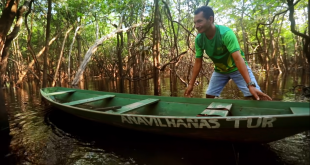The species that will be slaughtered will be the jacaré-açu and jacaretinga. The products will be sold in meatpacking plants, supermarkets, restaurants, hotel-hotels and properly regulated fairs.
-
Photo: Reproduction/Internet
Aiming at the slaughter and processing of alligators in the Amazon, the Agricultural and Forestry Defense Agency of the State of Amazonas (Adaf) certified, last Sunday (1), in the city of Uarini (565 kilometers from Manaus, as the crow flies), the first slaughterhouse and fish warehouse for the marketing of alligators with State Inspection Service (SIE).
The Plantar Company is located in the Paraná do Jarauá, at a distance of 30 meters from the São Raimundo do Jarauá Community, in the Mamirauá Sustainable Development Reserve, a Conservation Unit (UC), in the rural area of the municipality of Uarini. The company is authorized by the Amazonas Environmental Protection Institute (Ipaam) and has the support of the Government of Amazonas, through the Sepror System.
Regulation
Currently, the commercial management of alligators in Amazonas is regulated by Resolution No. 08 of the State Council of Environment (Cemaam), June 27, 2011, which establishes technical procedures for the management of alligators from Sustainable Use Conservation Units of the State of Amazonas (UCs), and by Normative Instruction (IN) No. 001/2011 Sepror, June 29, 2011, which establishes standards for slaughter and processing of alligator meat from extractive management programs in UCs in the state.
"I've been working with alligator management for about 15 years. And our dream was to create a structure that followed the protocols and the sanitary needs to guarantee a quality product from the management of wild animals. The most relevant thing about this plant is that we are in a team effort and we are armoring a structure, which will favor this new productive chain and our beneficiary communities", commented the researcher from Mamirauá Institute, Robinson Botero.
About the slaughterhouse
The establishment will have the capacity to produce more than 200 kilos of caiman meat, approximately equivalent to the slaughter of 30 caimans per day. Fresh whole carcasses and cuts, thighs and drumsticks, rind, ribs, and back will be sold. In addition, the skin will be sold for industrialization.
"Adaf has a fundamental role in the process of regularization and certification of the industry, because it guarantees the consumer a product of origin and hygienic and sanitary quality suitable for consumption. From now on, the slaughterhouse will be able to slaughter alligators and generate income, employment for the community and contribute to the state's economy," commented Adaf's manager of animal origin products inspection, Ramerson Ferreira.
Employment
It is estimated that approximately 54 employees will be employed, who will work in the production and technical administration of the capture activities and crocodile processing. The species that will be slaughtered are the jacaré-açu (Melanosuchus niger) and jacaretinga (Caiman crocodiles). The products will be sold in meat-packing plants, supermarkets, restaurants, hotel-hotels and properly regulated fairs.
"The importance today is for the community and for the municipality. We have been waiting for this slaughterhouse for a long time, and today the day has come for us to receive the certification. And it will generate a lot of income for us, for our community, and for our industry. I am thrilled", commented the president of the São Raimundo do Jarauá community, Antônio Cordeiro.
Sustainability
For the scientific-technical director of Mamirauá Institute, Emiliano Ramalho, the alligator slaughterhouse is another strategy for the use of resources in a sustainable way that is being implemented in the reserve in partnership with the communities.
"This remote slaughter structure will allow them to adequately manage the alligators. Possibly, in January we will do the first slaughter with commercialization of the animals that are being caught. And, as we always do, we think of strategies that can be applied in other areas and with great scientific basis to create knowledge in communities," said Ramalho, stressing that this project is another example of the reserve and hopes that it works as well as the management of pirarucu and can be applied, helping communities in Mamirauá, as well as the state.
With information from the advisory
 Manaus Ágil tourism and culture of the Amazon
Manaus Ágil tourism and culture of the Amazon